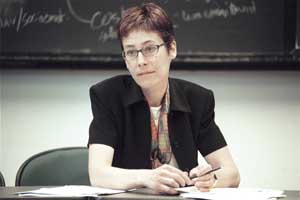C. Cybele Raver, Associate Professor in the Harris School
By Peter SchulerNews Office
 C. Cybele Raver |
C. Cybele Raver, Associate Professor in the Irving B. Harris Graduate School of Public Policy Studies, has received from her students a “Professor of the Year” award after only three quarters of teaching in the Harris School. She became an Associate Professor at the University after serving on the faculty of Cornell University’s department of human development as an assistant professor.
“I am really gratified and happy to be teaching students here,” Raver said. “I find that they are very smart and have a very strong commitment to doing their work well.” Students nominated Raver for her non-Core class, Principles of Developmental Psychology for Public Policy.
“The course covers the intersection between developmental psychology and public policy and examines ways that family processes may have a significant impact on a child’s well-being,” Raver said. “I wanted to help students understand how developmental psychologists model complex processes.”
Raver earned her Ph.D. at Yale University and studied under the noted psychologist Edward Zigler. “Ed Zigler was a master teacher,” Raver said. Zigler’s work provided an important model for ways to integrate developmental psychology and social policy in the contexts of poverty and early education intervention. At Harris, Raver continues to look for answers to these problems, including the impact of social policies on child and family well-being.
In the context of welfare reform and mandates for low-income women to work, Raver is currently analyzing the ways in which a family’s emotional climate, including a mother’s mental health, may be altered by changes in family income and the mother’s work over a period of time.
In addition to her doctoral studies with Zigler at Yale, Raver also cited developmental psychologists Jerome Kagan and Dante Cicchetti, under whom she studied in her undergraduate work at Harvard University, as models for her approach to teaching. “Dante had a way of electrifying the class with really interesting ideas,” Raver said. “He could take a bewildering array of variables and make sense of them so complex social problems that seemed totally overwhelming could be approached in rigorous, satisfying ways.”
Raver, who also studied documentary filmmaking at Harvard, decided she preferred to understand the compelling stories of individual lives by examining large-scale empirical evidence that could serve as a guide for the formation of public policy, and she finds the University the ideal place to do so. “It’s very exciting to be in a place where my colleagues so actively read and talk about one another’s work. This place offers a wonderful intellectual environment.”
![[Chronicle]](/images/small-header.gif)